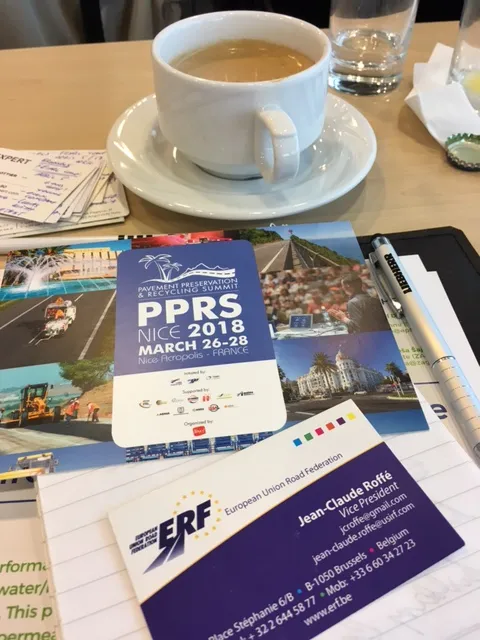Jacques Tavernier, chairman of PPRS Nice 2018, and Claude van Rooten, president of
A nation’s roads are its first and most important “main asset … essential for a country’s economic, social and environmental development”, said van Rooten. To help highway professionals worldwide keep their road networks up to scratch, PIARC has put together an online asset management manual.
The manual has been designed to help road organisations apply an asset management framework, he said.
The highway asset management manual - developed by PIARC - gives advice, guidance and case studies on how asset management principles can be used to support a more efficient approach to the maintenance of roads.
According to the authors, “there are many reasons why the appropriate level of asset management practice varies among road organisations as asset management practices consolidate. The manual is aimed at all those involved in managing highway infrastructure, including senior decision makers, asset managers and practitioners.”
It is not intended to replace successful approaches. Rather, it is a consistent approach to, and understanding of, the implementation and delivery of the benefits associated with asset management, notes the authors.
The asset management framework that PIARC recommends “addresses short-term and long-term condition ways to performance manage asset life, including timely preservation actions and considerations of risk and risk management. It also supports making the case for funding and better communication with stakeholders (to encourage) a greater understanding of how road infrastructure assets contribute to economic growth and the needs of national and local road networks.”
All of the opening speakers of day two at PPRS 2018 agreed that the global highways sector must adopt techniques similar to the online manual to preserve their road assets. Senior managers need to be much more open and engaged with road users. Meanwhile, the industry has got to communicate with the public more frequently and also more openly “so that the public becomes more supportive and understanding”.
Highways officials everywhere need to understand that funding construction and maintenance of roads is becoming more and more difficult. “We are facing severe financial problems,” said Bud Wright, chief executive of AASHTO, the
“In funding terms, we have to face up to the fact that we are competing with the needs of the broadband, water, policing and social care departments in most countries,” said Wright. Too many politicians are short-term and asset management strategies are going to have to be as clever as possible to win them over to spending large sums on maintaining the roads.
For Francois Poupard, the director-general of transport infrastructure in France, “if we delay maintenance spending today, we will only end up paying a higher price in the future”.
Smart, connected and autonomous vehicles need smart highways, added Poupard, and more modern finance tools to make sure we run the roads properly. “If we don’t, the future lies in ruins.”
PPRS: smarter, more sophisticated asset management is needed
Highway organisations around the world will need ever-more sophisticated frameworks to ensure their asset management is up-to-date and fit-for-purpose.
Jacques Tavernier, chairman of PPRS Nice 2018, and Claude van Rooten, president of PIARC, the World Road Association emphasised the point at at this week’s Pavement Preservations and Recycling Summit.
A nation’s roads are its first and most important “main asset … essential for a country’s economic, social and environmental development”, said van Roote
March 27, 2018
Read time: 3 mins
Highway organisations around the world will need ever-more sophisticated frameworks to ensure their asset management is up-to-date and fit-for-purpose.








